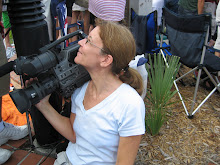http://www.neh.gov/grants/guidelines/BridgingCultures_Film.html
FROM DOC MENTORS:
FUNDING AND OPPORTUNITIES - It's a great time of the year!
Roy W. Dean Grant LA
Film and Video grants - dedicated to supporting films that are unique
and make a contribution to society. These grants provide a vast array
of in-kind services for projects in production worth close to 100K. Deadline June 30th, 2010.
Sundance Documentary Fund
- supports both US and international documentary films that focus on
current human rights issues, freedom of expression, civil liberties and
exploring critical issues of our time. Four areas of funding are
offered - development, production, post-production and engagement and
impact. Deadline: postmarked July 7th, 2010.
Kroll Fund for Jewish Documentary Film - a
generous grant funding post-production in the amount of up to 50K for
original documentaries that explore the Jewish experience. Deadline July 27th, 2010.
NEH Funding Initiative - Bridging Cultures Through Film - supports
projects that examine international and transnational themes in the
humanities through documentary film. Projects must be analytical and
deeply grounded in humanities scholarship. Deadline July 28th, 2010.
ITVS Open Call
- ITVS's largest funding initiative, providing completion funds for
single non-fiction television programs on any subject, from any
viewpoint. For US filmmakers already in production. Deadline: August 6, 2010.
Pacific Pioneer Fund - for emerging filmmakers in CA, WA and OR, granting up to 10K. All subjects welcome. Deadline August 15, 2010.
The Fledgling Fund
- supports innovative media projects that can play a critical role in
social change. The grant's primary focus is community engagement and
outreach. The next application cycle opens August 23, 2010 and closes October 1, 2010.
